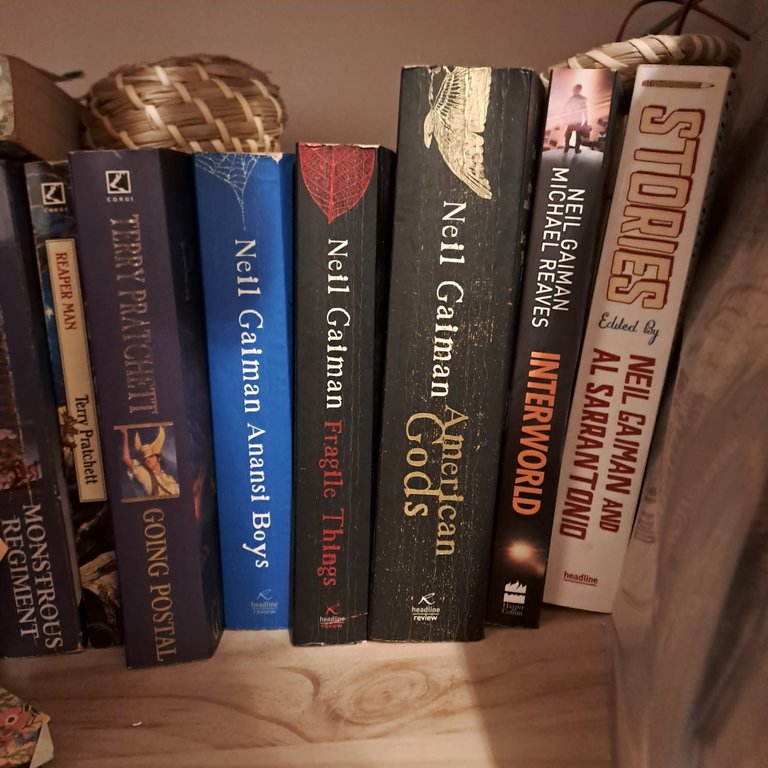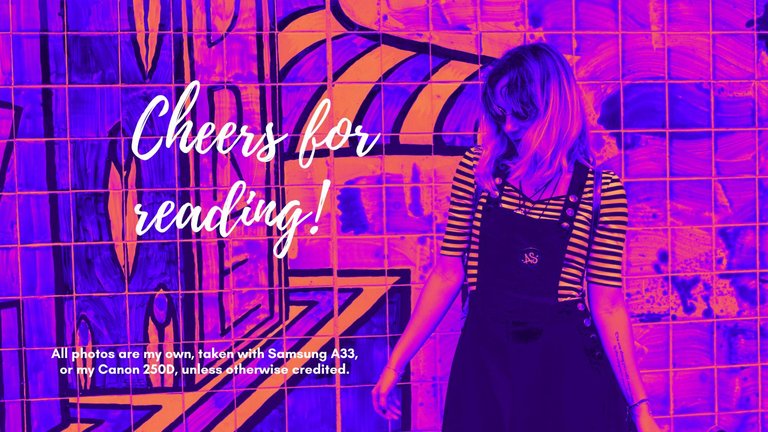I've been reading (inescapably) a fair bit about the recent sexual debacle surrounding one of my favorite authors, Neil Gaiman. It seems impossible to get away from these extremely graphic accounts of the man's sexual exploits as any and every publication (particularly British publications) seems to have something to comment on the matter. Understandably so. Gaiman is one of the biggest names in the fantasy genre who has elevated the once lowly, humble job title of author to new rockstar heights.
One of course wonders... how will I read him again? Or more commonly,
Can you separate an artist from his art?
I believe so, certainly. I've always been of an opinion that you should at least try to perform this seeming little miracle. After all, it is not false idols we are seeking out here - surely, the creator's sexual or personal proclivities shouldn't affect the quality of a book, film or painting. It has no bearing on your actual enjoyment of something beautiful, though we do live in an age of holier-than-thou moralists. We feel it is our duty to burn the book if discovering the author is an ungainly character.

Can you separate an artist from his work? In this case, can I read American Gods or my much-loved Sandman books without these off-putting tidbits about Gaiman's sex life floating into my head? I think so, quite. After all, it didn't disturb my reading none when I knew he was an excessively liberal, often siding with the cancel cluture he's now become a victim of. I didn't stop midway through a paragraph and think of some recent virulent anti-Trump tweet of his or whatever before... why should I be bothered now?
The truth is, we've developed a separate understanding of art. For a very long time, we had no way of knowing all these details about the artists in our midst, so we've become accustomed to digesting art without considering every last little detail about the creator's political views, sexual preferences, and/or other little idiosyncrasies. And what good times those were.
Of course, now that's changing. We're used to the ability to Google a director or actor right in the middle of a film, so that by the end, we can safely walk out of the cinema knowing everything about them from their pet's name to their stance on abortion. We're changing the way we perceive art and that is very dangerous.
It's highly unlikely you'll find a creator that has the exact same views as you on every single thing.
A triage is necessary - but then, what points are non-negotiables and which agreements can I compromise on? Do I really need a favorite director to have the same political views as me? Not really. I've found that many artists are capable of being wonderfully expressive and gifted creators while holding opinions quite far removed from my own. Art, after all, is about our shared humanity, not the (often petty) differences that tear us apart. As long as you're human and able to tap into that humanity in a way that resonates with mine, why should it matter what you think about the Democrats or Brexit?
Criminality is, of course, a different matter, but unfortunately with many of these #MeToo cases, we're seeing these creators judged and juried by the mainstream gossip media long before they see the insides of an actual courtroom. That often detracts from the fact that many of these "cases" don't actually have much to stand on in terms of actual, factual courtroom evidence.
Is that fair? Personally, I don't think so. I don't think such information should be circulated unless there's tangible, serious proof that this person might be a criminal. Allegations, as shown in Vinterberg's masterful "The Hunt", are often tantamount to convictions in the eyes of your peers.
A far more interesting question to me in this matter is,
Why are they working so assiduously to desecrate art?
You can no longer enjoy many a gallery, sculpture, classic film, novel or symphony because its creator was found to hold views we find foreign or off-putting today. Slavery. Racism. Feminism. Abortion. These are just a few big subjects our world is trying to cancel artists of the past over.
Artists of the present are not doing much better. They live now in a world where they must watch anything and everything they say or do online and make sure they are always on the right side. Surely, one wonders how such a pillar of modern woke culture as Neil Gaiman could be so careless as to behave in this way in the first place. Perhaps modern artists should be judged by a different standard - they at least know what the status quo is. They also know we have the means to discover and popularize globally their dirtiest secrets. Artists of the past didn't.
Still, that shouldn't be an argument in favor of confusing an artist with their art. We make art to escape ourselves - shouldn't then an artist be awarded some reprieve in this public online courtroom?
It was a good thing when the artist was a mysterious, reclusive, perhaps even mythical figure. Because we humans require myth. We require art that transcends the bullshit wars we fight with one another every single day. Art should by its very nature trample politics, gender wars, and speak to the very essence of humanity.
Should Neil Gaiman be canceled? If his alleged offenses are proven criminal in a court of law, then he should be punished by the law. Should his books, brilliant, or the many fantastic screen adaptations be hidden from view because he's a sexual sadist in the privacy of his own home with (in as far as we've been able to establish) consenting adults?
Why?
I believe it should, that great art exists for the enjoyment and elevation of the human spirit and should not be muddied and denigrated by lowly human impulses. If we were to hold a torch to all the great artists of yore that modern culture would deem problematic, we would have no art worth speaking of.

Totally agree with everything you say. It's right to condemn the person - if they did something that's actually illegal and criminal - but we all should be more chill towards what they produced in the artistic field.
I think when you produce a piece of something that could be considered as art, it gets its own existence and some kind of life force that is (almost) totally disconnected from its creator. And that's one of the good sides of artistic creations. That they become somewhat universal
These types of things annoy me, in a lot of ways. As long as the dude isn’t touching kids or kidnapping and raping people (men or women, don’t know his choices) then for the most part leave it alone. The issue is the news has absolutely nothing to write or do besides constantly push these obnoxious stories.
I thankfully don’t listen to these types of things so I wouldn’t even find out until years or decades later. It’s better that way lol
Honestly the fact that you can assess actors and directors informations give us an edge to people of the past generation and I love the fact good actions are taken towards criminals no matter their status.
We shouldn't be cancelling someone because so an so said they did something. People lie! How do we know they actually did it, if no evidence has been presented? As the old saying goes don't judge a book by it's cover. Well if you apply that logic to an author. Don't judge an author by what has been said, judge them by your own research. And if you can't find hard evidence to support what has been said, then there is a chance it is a lie. And how do we know they weren't trying to crate an escape form their reality that they don't like. A book is a tool and should be treated as such.
I find it hard in this very specific case. Usually I get the news and think well yeah world is crazy and power corrupts people. But in Neil's case it's like being deeply disappointed by a relative. However I won't burn his books (MY books, they cost ME a LOT of money) and will definitely read them again in the future. Not now, but in the future.
Congratulations @honeydue! You have completed the following achievement on the Hive blockchain And have been rewarded with New badge(s)
You can view your badges on your board and compare yourself to others in the Ranking
If you no longer want to receive notifications, reply to this comment with the word
STOP